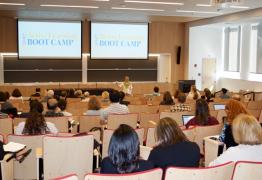2017 Boot Camp Recap
Our second annual Active Learning Boot Camp built on the success of 2016's inaugural event, capping off a momentous year for active learning at Rutgers that included the construction of four active learning spaces that were used by over 5,000 students over the course of the academic year. The brand-new collaborative spaces of the Rutgers Academic Building provided a perfect venue for faculty and staff to come together to learn about, discuss, and engage in active learning. For summaries, resources, and links relating to each Boot Camp session, click on the sections below.
Session Recaps
 Dr. Maryellen Weimer, a leading author and commentator on higher education, joined us to talk about how, when, and why to use active learning. Dr. Weimer, Professor Emeritus of Teaching and Learning at Pennsylvania State University and contributor to a teaching blog with 130,000 subscribers, challenged faculty to revisit their assumptions about active learning and question whether they are using it in a targeted manner that meets their desired learning outcomes. Practicing what she preached, her presentation was driven by discussion and breakout sessions.
Dr. Maryellen Weimer, a leading author and commentator on higher education, joined us to talk about how, when, and why to use active learning. Dr. Weimer, Professor Emeritus of Teaching and Learning at Pennsylvania State University and contributor to a teaching blog with 130,000 subscribers, challenged faculty to revisit their assumptions about active learning and question whether they are using it in a targeted manner that meets their desired learning outcomes. Practicing what she preached, her presentation was driven by discussion and breakout sessions.
To learn more about Dr. Weimer's take on higher education, look for her contributions to the Faculty Focus blog. She has also edited or authored eight books including a 1995 anthology edited with Robert Menges, Teaching on Solid Ground. She was primary author of a Kendall-Hunt publication, Teaching Tools, a collection of collaborative, active, and inquiry-based approaches to be used in conjunction with Biological Perspectives, a NSF-funded introductory biology text, created by Biological Sciences Curriculum Studies (BSCS). Over 35,000 copies of the first (2002) and significantly revised second edition (2013) of her book, Learner-Centered Teaching: Five Key Changes to Practice have been sold. Her book, Enhancing Scholarly Work on Teaching and Learning, was published in February 2006 and Inspired College Teaching: A Career-Long Resource for Professional Growth was released by Jossey-Bass in March, 2010.
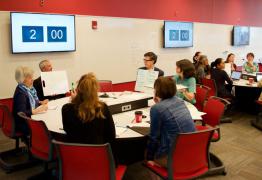 In this session, attendees explored various technology and tools that can be used to facilitate collaborative work. Divided into groups, participants rotated through three stations with various challenges that required them to work together. Groups used tablet whiteboards available in Rutgers-NB active learning classrooms to work separately in subgroups before sharing their ideas with the rest of the group. Solstice wireless display sharing was used at one table to build a media gallery that could be used as part of an instructor-guided discussion. Participants gathered around wall-mounted whiteboards to collaborate on a diagram of Rutgers' administrative structure. At another station, guests used "table screen sharing" to perform research on laptops before displaying them to the whole group so they could compare and contrast results. Finally, attendees engaged in a note-swapping exercise that emphasize the core concepts of a lesson. To learn more about the technology and furniture available in Rutgers-NB active learning classrooms, visit the AL Spaces page. For more information on how and why to use Solstice wireless display sharing, visit the DCS's Solstice page. You can also peruse our growing list of sample in-class exercises on the ALC's activities page.
In this session, attendees explored various technology and tools that can be used to facilitate collaborative work. Divided into groups, participants rotated through three stations with various challenges that required them to work together. Groups used tablet whiteboards available in Rutgers-NB active learning classrooms to work separately in subgroups before sharing their ideas with the rest of the group. Solstice wireless display sharing was used at one table to build a media gallery that could be used as part of an instructor-guided discussion. Participants gathered around wall-mounted whiteboards to collaborate on a diagram of Rutgers' administrative structure. At another station, guests used "table screen sharing" to perform research on laptops before displaying them to the whole group so they could compare and contrast results. Finally, attendees engaged in a note-swapping exercise that emphasize the core concepts of a lesson. To learn more about the technology and furniture available in Rutgers-NB active learning classrooms, visit the AL Spaces page. For more information on how and why to use Solstice wireless display sharing, visit the DCS's Solstice page. You can also peruse our growing list of sample in-class exercises on the ALC's activities page.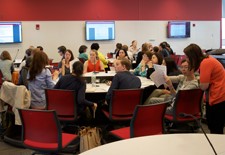 In this morning session, Dena Leshner from the Teaching and Learning with Technology Team, discussed a framework for evaluating the quality of a course. Attendees took a close look at the relationship between learning goals and course activities, how learners interact, and the information students need to get off to a great start. These essential focus areas help ensure a course is purposeful, organized, and supportive of student learning.
In this morning session, Dena Leshner from the Teaching and Learning with Technology Team, discussed a framework for evaluating the quality of a course. Attendees took a close look at the relationship between learning goals and course activities, how learners interact, and the information students need to get off to a great start. These essential focus areas help ensure a course is purposeful, organized, and supportive of student learning.
Resources
- Aligning Assessments, Objectives, and Instructional Strategies
- Bloom's Taxonomy Action Verbs
- Demo Syllabus
- Five Things to Do on the First Day of Class
- How to Write Program Objectives/Outcomes
- Increasing Interaction in Online Learning Environments
- Mapping Success: Essential Elements of an Effective Online Learning Experience
- Quick Review Checklist
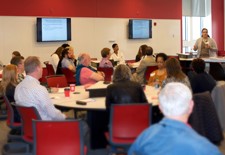 Jeniffer Obando and Dena Leshner of the Teaching and Learning with Technology Team, led this staff-focused workshop on ways that active learning can be used in professional settings. They discussed how collaborative work can be used to break the monotony of information delivery and allow for more meaningful cognitive connections to be made. Jeniffer and Dena helped attendees think of broader application of active learning techniques beyond student learning in the classroom.
Jeniffer Obando and Dena Leshner of the Teaching and Learning with Technology Team, led this staff-focused workshop on ways that active learning can be used in professional settings. They discussed how collaborative work can be used to break the monotony of information delivery and allow for more meaningful cognitive connections to be made. Jeniffer and Dena helped attendees think of broader application of active learning techniques beyond student learning in the classroom.
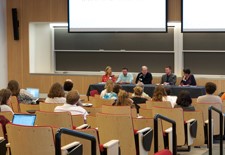 Chris Morett, Director of Scheduling & Space Management, moderated a wide ranging panel discussion featuring Rutgers faculty using active learning across the academic spectrum. Panelists were Premi Chandra (SAS-Physics & Astronomy), Charlie Collick (SCI-Library & Information Science), Joe Hughes (SAS-Economics), John Kerrigan (SAS-Mathematics), and Sandra Russell Jones (SAS-History).
Chris Morett, Director of Scheduling & Space Management, moderated a wide ranging panel discussion featuring Rutgers faculty using active learning across the academic spectrum. Panelists were Premi Chandra (SAS-Physics & Astronomy), Charlie Collick (SCI-Library & Information Science), Joe Hughes (SAS-Economics), John Kerrigan (SAS-Mathematics), and Sandra Russell Jones (SAS-History).
Alice Seneres and Sari Katzen provided attendees with an introduction to the Learning Assistant (LA) Program, which matches undergraduate students with faculty to help run courses. The group discussed how LAs can be a great asset when tackling active learning, especially in larger classes. For more information, visit the LA Program page.
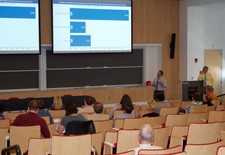 Wilson Contreras and Dan Bello of Digital Classroom Services, tackled the hows and whys of student response systems (a.k.a. polling or clickers). Rather than focusing on the technical steps required to operate student response systems, the discussion focused on the best ways to effectively use polling as a teaching tool. In particular, they explored the ways response systems can be used to reinforce concepts and provide feedback on understanding to both students and instructors. Review the presentation slides for a recap of the key points in their workshop.
Wilson Contreras and Dan Bello of Digital Classroom Services, tackled the hows and whys of student response systems (a.k.a. polling or clickers). Rather than focusing on the technical steps required to operate student response systems, the discussion focused on the best ways to effectively use polling as a teaching tool. In particular, they explored the ways response systems can be used to reinforce concepts and provide feedback on understanding to both students and instructors. Review the presentation slides for a recap of the key points in their workshop.